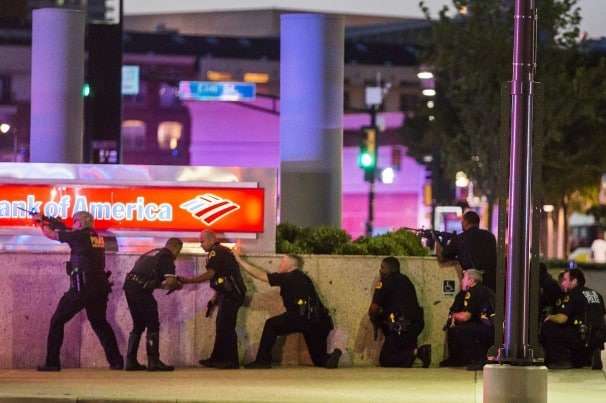The Volokh Conspiracy
Mostly law professors | Sometimes contrarian | Often libertarian | Always independent
Things to remember as we contemplate the anti-police atrocity in Dallas

The murder of five police officers in Dallas is both a terrible atrocity in itself, and likely to further poison our political discourse about law enforcement issues. To state the obvious, there can be no justification for such a terrible crime. Law enforcement officials perform a valuable public service in protecting us against violence and theft - often at the risk of their own safety. Those who kill police for no defensible reason harm not only the officers and their families, but also the entire community.
If you believe, as I do, that we have a serious problem with police militarization and excessive use of force, this type of attack is doubly tragic. Its predictable effect will be to undermine public sympathy for victims of abusive police behavior, and increase political opposition to reform efforts. If the Dallas killers were motivated by a desire to protest police misconduct, they could not have chosen a more counterproductive approach to promoting their cause.
It is entirely understandable that we feel pain and anger in the immediate aftermath of such a terrible event. Almost everyone will agree that the perpetrators should be tried, and severely punished, if found guilty. But, hard as it is, we should also keep some other things in mind as we consider the implications of this atrocity.
First, however much outrage we feel, we should remember that our immediate emotional reactions to tragedy are rarely a good guide to policy. Ignorance and illogic are unusually likely to influence our thinking at such times. This is particularly likely to be the case if we reflexively conclude that the event in question reinforces our preexisting views - in this situation, views about gun control, the "war on cops," police abuses, and other related issues. We should question our initial impulses, and think carefully and calmly before advocating any major new policy initiatives - particularly ones that might be costly in terms of lives, resources, and civil liberties.
Second, we should recall that there is no contradiction between condemning both crimes against police, and crimes committed by the police themselves. Both are serious dangers to public order, and both deserve severe punishment.
Third, we must keep in mind that the Dallas attack was extremely unusual. Claims of a widespread "war on cops" are not supported by the evidence. Last year was the second safest year on record for police officers,, as measured by the number of gun-related police deaths. Moreover, it would be wrong to suppose that state and local governments do not take anti-police violence seriously. Many states already impose extra punishment for crimes against on-duty police officers, and prosecutors generally put a high priority on such cases. In the state of Texas (where the Dallas murders occurred), the murder of a law enforcement officer "acting in the lawful discharge of an official duty" qualifies for the death penalty. It's hard to impose a more severe punishment than that.
None of this will be of much comfort to the slain officers, or their families. But it is nonetheless important to keep in mind as we consider what to do in the future. The rarity of incidents like this and the fact that we already have severe punishments for crimes against police officers suggest that it will be very difficult to further reduce the incidence of such crimes by adopting more punitive policies.
These points are relevant to conservative proposals to address the issue by increasing punishment for anti-police violence, such as the ill-advised Blue Lives Matter Act. They also count against liberal efforts to combat the problem by increasing gun control. The relatively few people who deliberately target police officers despite the severe punishments for doing so are unlikely to be easy to deter.
Ultimately, there may be no simple solution to this problem. But we are more likely to deal with it constructively if we avoid yielding to our knee-jerk impulses. At the very least, it might help us avoid responses that cause more harm than good.


Show Comments (0)